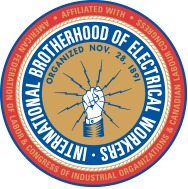
The Government of Saskatchewan has signed a Letter of Intent (LOI) to partner with the International Brotherhood of Electrical Workers (IBEW) with the goal to enhance apprenticeship training within the electrical, powerline, and nuclear sectors.
Talks between Saskatchewan Premier Scott Moe and IBEW Canada International Vice President Russ Shewchuk began in 2022. “It was an open discussion,” Shewchuk reflected. “We met to review some of the challenges they were facing and how the IBEW could provide solutions. From there, the dialogue continued to evolve.”
Saskatchewan, which has attracted over $40 billion in new investments over recent years, came forward with a strong mandate to expand apprenticeship training opportunities and bolster apprenticeship success rates, which hovered at 62% overall and a mere 54% for Construction Electrician apprentices [1]. Under this new training alliance, they hope to see these numbers rise.
Shewchuk credits being able to showcase successful IBEW-Government partnerships in other areas of the country, such as Ontario, as proof that the IBEW can deliver positive results. “We’ve developed a recipe for success that can be replicated across the country.”
Saskatchewan Immigration and Career Training Minister Jeremy Harrison championed this point, “IBEW-led training in other provinces has delivered exceptional results with a high rate of success, and we expect this training will show similar results here in the Saskatchewan to build an even stronger skilled trade labour force which will support our strong and vibrant communities.”
Saskatchewan Premier Scott Moe stated, “By expanding apprenticeship training options in our province with the IBEW, we are ensuring Saskatchewan people are provided with the high-quality training they need to be first in line for new opportunities and are prepared for long, rewarding careers.”
Under a Memorandum of Understanding with the provincial Ministry of Immigration and Career Training, IBEW Local Unions in Saskatchewan will offer block training in electrical and powerline disciplines beginning in 2025. Future training opportunities will also include nuclear power.
IBEW Local 529 Business Manager Murray Palmer is happy to see Saskatchewan adopt a model similar to that of other provinces. Perhaps just as important as ensuring apprenticeship success is the positive impact their success will have on the community. He notes, “Electricians are in demand across the country, but if we want to attract investment for new projects we need to ensure that we can provide the construction workers needed to build them. If we give these good opportunities to young folks that are already living here, they can support their families and keep the benefits in the community.”

Jeff Sweet, Business Manager for IBEW Local 2038, a construction local based out of Regina, echoes Palmer’s long-term outlook. “With a focus on good paying, long term careers building and maintaining all future projects, we mean to ensure Saskatchewan’s workers are prepared with top-notch instruction and hands-on learning.”
“Top-notch” instruction is at the core of the IBEW and is engrained deeply at IBEW Training Centres across North America. Boasting some of the most qualified and passionate instructors in the industry, IBEW trainers truly care about the progression and continued success of their students. One doesn’t need to look further than IBEW apprenticeship success rates to see the difference IBEW Training Centres provide.
Tyler Holmen, Business Manager of IBEW 2067 has been pushing this difference for a long time. He reflects on previous training offered by other providers, “…our local has always felt for 50 years that we would’ve been better suited to provide that training and so to have that opportunity now it’s historic for our local.”
Shewchuk was grateful for Premier Moe’s commitment to investing in the future and providing opportunities to the people of Saskatchewan. “I’m confident our IBEW Local Unions in Saskatchewan will elevate training standards across the province. The IBEW is the best choice for a training partner in the skilled trades. We know similar issues exist in other provinces and we hope our proven roadmap of success will lead to similar conversations with labour leaders across the country.”

[1] Source : www.saskapprenticeship.ca



